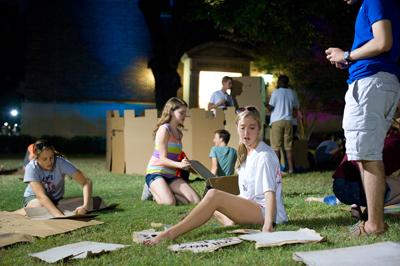
SMU’s Mustang Heroes second annual “Sleep in a Box” event promoted poverty awareness Saturday night. (Sidney Hollingsworth/The Daily Campus)
The quad in front of McElvaney Hall was littered with boxes. Pizza boxes slightly bigger than the ones from Mac’s Place and industrial sized cardboard boxes covered the lawn. SMU’s Mustang Heroes hosted its second annual “Sleep in a Box” event to promote poverty awareness Saturday night.
“I think it’s a great [way] to just promote awareness in a fun, creative way,” freshman Sam Perry said. “It’s just a great way to get to know each other and share the same values about homelessness.”
Mustang Heroes was created just three years ago. The student-run organization already has over a hundred members and plans to raise $5000 for local organizations.
President Carissa Grisham said that she hoped that the event broke some stereotypes students have about the homeless and motivated them to get involved
“Everyone who comes out has a great time,” Grisham said.
Mustang Heroes partnered with Vogel Alcove, a local organization that works with homeless children.
President and CEO Karen Hughes believes that raising awareness is the first step to getting people engaged in the community.
“I think it’s good for this generation to understand that so much of what is good in this world comes from philanthropy,” Hughes said.
“Most people don’t think of children when they think of homelessness. Half [of] the homeless population in Dallas are women and children.”
Hughes recognized “the difference that just intervening in [children’s] lives early on can make” is imperative.
Mustang Heroes also works with local children in poverty as part of tutoring programs and other service projects.
Junior Jordan White, who began Mustang Heroes with Grisham his freshman year, said that ‘Sleep in a Box’ was all about educating the SMU community on just how much goes on just outside of Highland Park.
“Five miles south, north, east, west, there are people that are homeless and there are people that are in need that we can do something for,” White said.
“I think people… just haven’t had the opportunity to realize how much goodness they can do. [We’re] trying to create service, kindness, and make that an integral part of the culture on campus.”
White says homelessness isn’t “going to get any smaller.”
But he hopes that by students seeing more and more of the homeless population near campus, they can “develop a deeper understanding of what’s really going on.”
“I think it’s really important for us to not neglect that part of our community,” White said.









